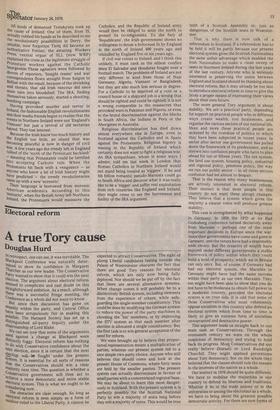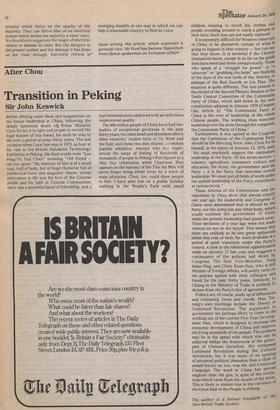Electoral reform
A true Tory cause
bouglas Hurd
In retrospect, one can see, it was inevitable. The Blackpool Conference was naturally deter!fled to show its confidence in Margaret inatcher as our new leader. The Conservative PartY wanted to show that it could win the next election. The argument about electoral reform seemed to complicate and cast doubt on this straightforward ambition. As a result, although ere was a successful fringe meeting, the Lonference as a whole did not want to know. But since then discussion has gone on steadily within the party, and Central Office have been scrupulously fair in making this Possible. The Hansard Society has set up a distinguished all-party inquiry under the chairmanship of Lord Blake. We can see now that some of the arguments „ib.sed against 'a change at Blackpool were 7Istinctly foggy. Electoral reform has nothing `O do with Conservative confidence about the next election, since it is certain that the next ejection will-be fought under the present sYsteM. It is essential for all sorts of reasons that the Conservatives should win a clear Majority next time. The question is whether a , Conservative government will then act to achieve a more democratic and more stable electoral system. This is what we ought to be considering now. The obstacles are clear enough. So long as electoral reform is seen simply as a form of outdoor relief to the Liberal Party, it cannot be
expected to attract Conservatives. The sight of plump Liberal candidates fasting outside the Palace of Westminster obscures the fact that there are good Tory reasons for electoral reform, which are only now being fully deployed. Nor should we be put off by the fact that there are several alternative systems. When change comes it will probably be to a distinctively British system, including elements from the experience of others, while safeguarding the single-member constituency. This could be done by modifying the German system to reduce the power of the party machines in choosing the members, or by improving the STV system so that each member after election is allocated a single constituency. But the first task is to win general acceptance of the need for reform.
We were brought up to believe that proportional representation meant a multiplication of parties, whereas our present system led to a nice simple two-party choice. Anyone who still believes this should come and look at the present House of Commons, where forty seats are held by the smaller parties. The present system can actually discriminate in favour of small parties with a concentrated regional base. We may be about to learn this most dangerously in Scotland. With the present system it is perfectly possibly for the Scottish National Party to win a majority of seats long before they win a majority of votes. This would be true both of a Scottish Assembly or, just as dangerous, of the Scottish seats in Westminster.
That is why there is now talk of a referendum in Scotland. If a referendum has to be held it will be partly because our present electoral system gives the Scottish Nationalists the same unfair advantage which enabled the Irish Nationalists to make a clean sweep of seats in Southern Ireland during the last years of the last century. Anyone who is seriously interested in preserving the union between England and Scotland should be thinking about electoral reform. But it may already be too late to introduce electoral reform in time to give the Scots a proper means of expressing their views about their own future.
The more general Tory argument is about stability. We are a practical party, depending for support on practical people who in different ways create wealth, run businesses, and organise the various sectors of our national life. More and more these praetical people are sickened by the overdose of politics to which they have been subjected in recent years. In sector after sector one government has pulled down the framework of its predecessor, and so thrown into confusion people who have to plan ahead for ten or fifteen years. The tax system, the land use system, housing policy, industrial and regional policy, pensions policy, the way we run our public sector in all these sectors confusion had led almost to despair.
That is the reason why many businessmen are actively interested in electoral reform. Their instinct is that most people in this country do not want these abrupt changes. They believe that a system which gives the majority a clearer voice will produce greater stability.
This case is strengthened by what happened in Germany. In 1959 the SPD at its Bad Godesberg conference turned decisively away from Marxism perhaps one of the most important decisions in Europe since the war. Since then governments have come and gone in Germany, and the voters have had a reasonably wide choice. But the creators of wealth have enjoyed under different governments a stable framework of policy within which they could build a level of prosperity, which we in Britain can only envy. But, of course, if Germany had had our electoral system, the Marxists in Germany might have had the same success within their party as our own Marxists. They too might have been able to show that you do not have to be moderate to obtain full power in a moderate country, provided the electoral system is on your side. It is odd that some of those Conservatives who most vehemently oppose socialism in this country also defend an electoral system which from time to time is likely to give an extreme form of socialism unwarranted and destructive power.
This argument leads us straight back to our main task as Conservatives. Through the nineteenth century we were on the whole suspicious of democracy and trying to hold back its progress. Moss, Conservatives did not really believe Disraeli or Lord Randolph Churchill. They might applaud perorations about Tory democracy, but on the whole they believed that the classes should rule the masses in the interests of the nation as a whole.
Our instinct in 1976 should be quite different. We have to mobilise the majorities in our country to defend its liberties and traditions. Whether it be in the trade unions or in the universities or among the electorate as a whole, we have to bring about the greatest possible democratic actiVity. For there are new forms of tyranny which thrive on the apathy of the majority. They can thrive also on an electoral system which denies the majority a clear voice. We should not exaggerate the magic of electoral reform or dismiss its risks. But the dangers of the present system and the damage it has done us are clear enough. Electoral reform is' emerging steadily as one way in which we can help a reasonable country to find its voice.
Since writing this article, which expresses a personal view, Mr Hurd has become Opposition Front Bench spokesman on European affairs



































 Previous page
Previous page